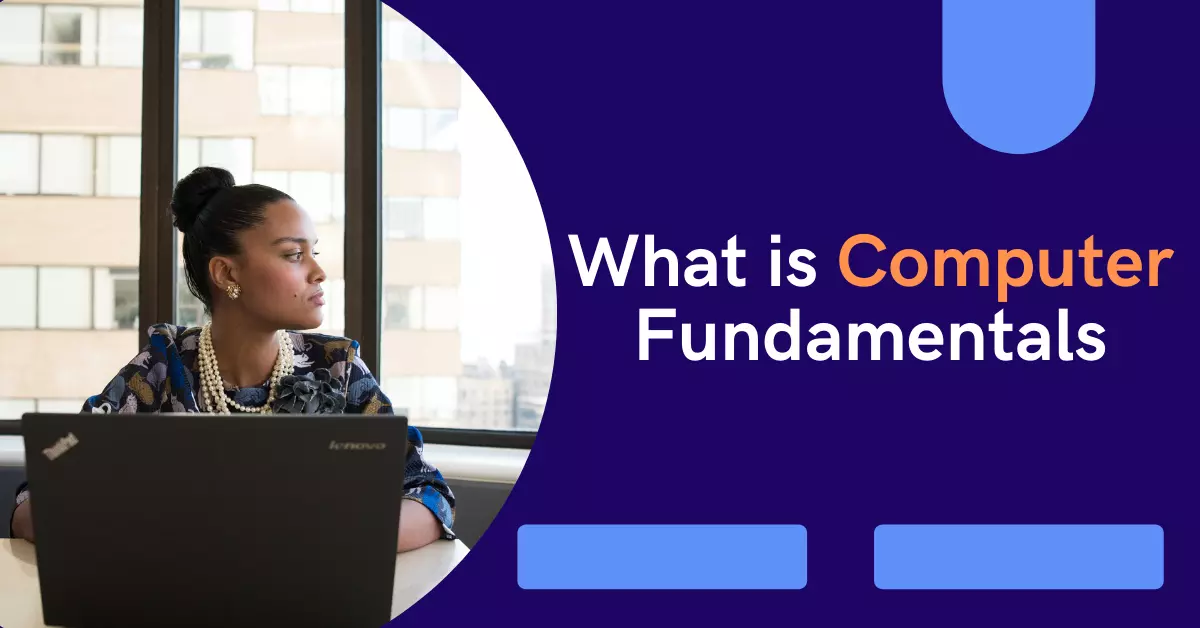Define What is Computer Fundamentals:: It can be described as the learning or studying of some basic functions of computers starting from their origin to the modern day.
Study of basic computer types to their characteristics, advantages, and disadvantages are included in the Learning of fundamentals of computers.
Before Shifting to advanced computer knowledge, it is highly recommended to be aware of this topic thoroughly as it would make you more confident and comfortable while acquiring more advanced computer skills.
A Computer can be defined or described as a machine or device that can work with information to store, retrieve, manipulate, and process data.
The word computer is derived from a "Latin" word which means to calculate.
A computer can be further defined as a programmable machine that is used for numerical calculations.
Some years back, these devices | and machines were used only for the purpose of calculations, but presently they are widely and proudly used in all sections of human society.
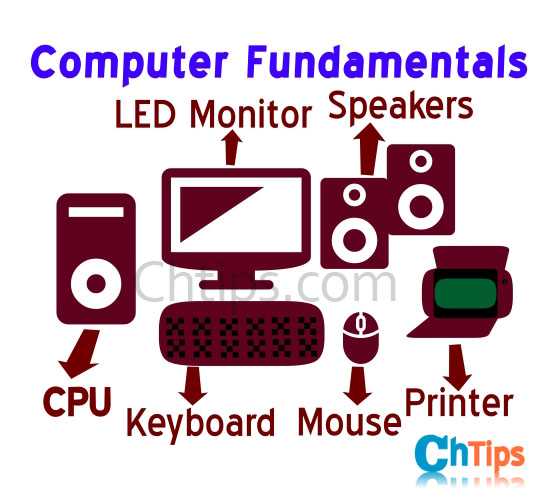
Modern Computers are incredibly advanced thanks to the new up-gradation and enhancement of technologies.
They can store huge amounts of data in internal as well as external storage units. Computer Hard disk is the external source of storing data.
These days computer speed has dramatically increased the work or tasks which used to take long hours to perform can be done in a few seconds.
This is because of the rapid development in the IT [Information Technology] sector, especially in the computer hardware section
The Computer peripherals and devices manufactured these days are of the highest quality at affordable prices.
Technology has made these devices perform more speedily than ever before also, this is an important characteristic of computer systems that made them very famous and a part of human lives.
It has also been observed that the life of modern peripherals and devices has been extended due to the excellent quality of raw materials used while preparation of these devices.
For example the warranty a hard disk drive is up to 2 to 5 yrs.
A computer’s speed mainly depends on factors such as What type of motherboard you are using, Processor Speed, and RAM [Random Access Memory].
Motherboard
A Computer Motherboard is designed on a piece of PCB Which is called a Printed Circuit Board, where all other components are attached to it, such as hard disk, processor, ram, etc.
Processor:: Processor is again called CPU, which stands for Central Processing Unit.
It is also called as Heart | Brain of Computer Systems.
RAM [Random Access Memory]
RAM stands for Random Access Memory, a temporary storage medium and volatile memory.
They tend to lose data when the power is off.
However, the speed of the computer depends upon RAM as well.
You can install more ram capacity to increase your computer speed, but first, you have to check the compatibility factors of motherboards and other device components.
Hard Disk
This permanent computer storage unit can store data in high volume, and you can retrieve data whenever and wherever you need it.
This HDD is available in the market with huge data storage capacity.
Basic Fundamental Functions of Computer
There are mainly four common functions of computer system
- Input
- Output
- Processing
- Storage
1. Input
The Computer receives its data from input devices in the form of raw data, which is later processed in human-readable form with the help of other computer devices.
The primary input devices of computer system are
- Keyboard
- Mouse
- Scanner
- Trackball
- Light Pen
- Joystick
2. Output
The output devices of computer receive data from the system and further process the data in human-readable form.
Some common output devices are
- Printers
- Monitors
- Speakers
- Headphones
- Projectors
3. Processing
This is the core function of the modern-day Personal Computer.
When the data is received from the memory it transfers the data or information for further processing.
4. Storage
There are mainly two storage units of the personal computer [PC]
- Primary Storage
- Secondary Storage
Primary Storage
Random Access Memory [RAM] is the primary storage unit of computers.
Secondary Storage
Hard Disk Drives and Pen drives are called secondary Storage units.
Why Computer Fundamental is Important?
To learn and operate computer systems, one should be aware of basic computer knowledge and the fundamentals of computers.
The skills learned in this course can be applied in almost any environment where there is a need for computer support or technical assistance.
Computer Fundamental is important because it gives you a foundation for understanding computer science and programming.
It also helps you understand how computers work, which can help you design programs or build websites.
The basic computer helps you understand the basic functionality of a computer, its working, data handling, memory management, and communication over networks.
You can also acquire basic knowledge in playing with hard disks, like the folder and file structure.
Computer programming and building websites and software can be easy when students have strong foundation.
Learning computer fundamentals and basics of computers is extremely important as it builds the foundation for a beginner.
The solid foundation will eventually help you to become a pro user.
Some common skills to acquire while learning computer fundamentals are.
- Software Installation.
- Using Common Applications.
- Spreadsheets.
- Word Processing.
- Using and Accessing the Internet.
- Social Media Websites.
- MS -Office.
- Technical Assistant With the help of Google.
Learning computer fundamentals will increase your basic skills and knowledge, make you a more advanced user than before, and eventually make you a master.
What Topics Does Computer Fundamentals Covers?
Computer Fundamentals Full Course Syllabus Download PDF
Useful Video On: Computer Fundamentals
Fundamentals of Computer Applications Topics
The fundamentals of computer application is a course that include study of
- Basic of Computer Science.
- Basic Computer System Architecture.
- Basic Software Principle.
- Computing Devices.
- Data Structure.
- Programming Basic.
- Algorithms.
Nowadays, more advanced topics are included in learning computer applications for students with basic computer knowledge to make them more advanced learners.
- Computer Hardware.
- Computer Networking.
- Artificial Intelligence.
- Data Science.
- Cybersecurity.
- Spreadsheets.
- Word Processors.
- Working Principles of Computer System.
- Presentations [PPT].
- File Management.
- Internet.
- Installing Software Packages.
- Assembling and Dissembling of Desktop and Laptops.
After completing this course, students will be job ready and make their own careers.
What are the Five Basic Computer Skills?
- Typing.
- Communications.
- Using Spreadsheets and word processing documents.
- Computer Programming.
- Image Editing and Online Research.
- Online Shopping and Online Trading.
How Many Computer Fundamentals Are There?
There are three types of computer fundamentals
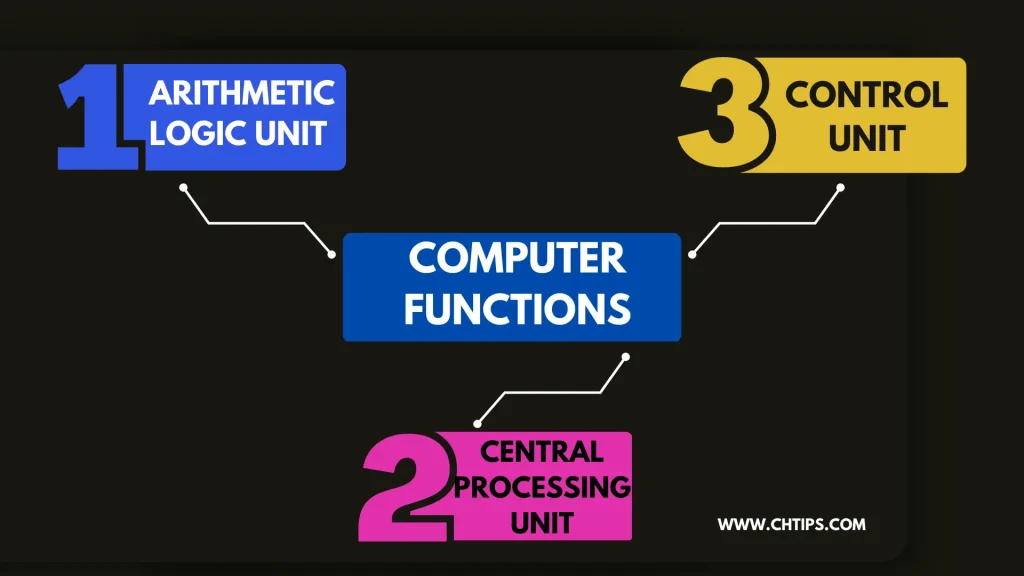
- Arithmetic and Logic Unit.
- Control Unit.
- Central Processing Unit [CPU]
What are the Four Basic Functions of Computer?
There are four basic functions of the computer
- Input.
- Output.
- Processing.
- Storage.
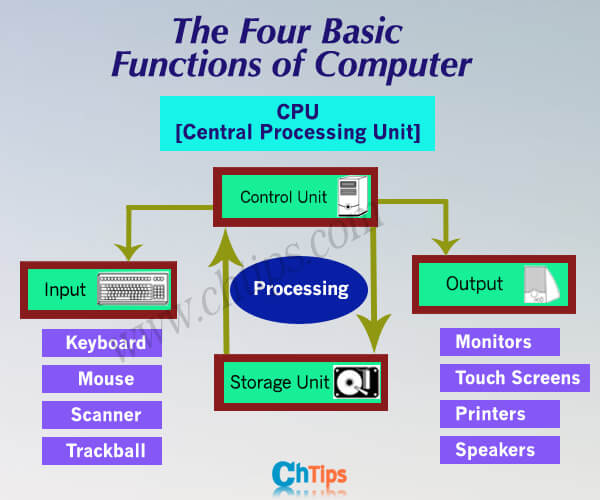
What are the 6 Qualities of a Computer?
The 6 qualities of computer system are.
- Maintainability.
- Correctness.
- Reusability.
- Reliability.
- Portability.
- Efficiency.
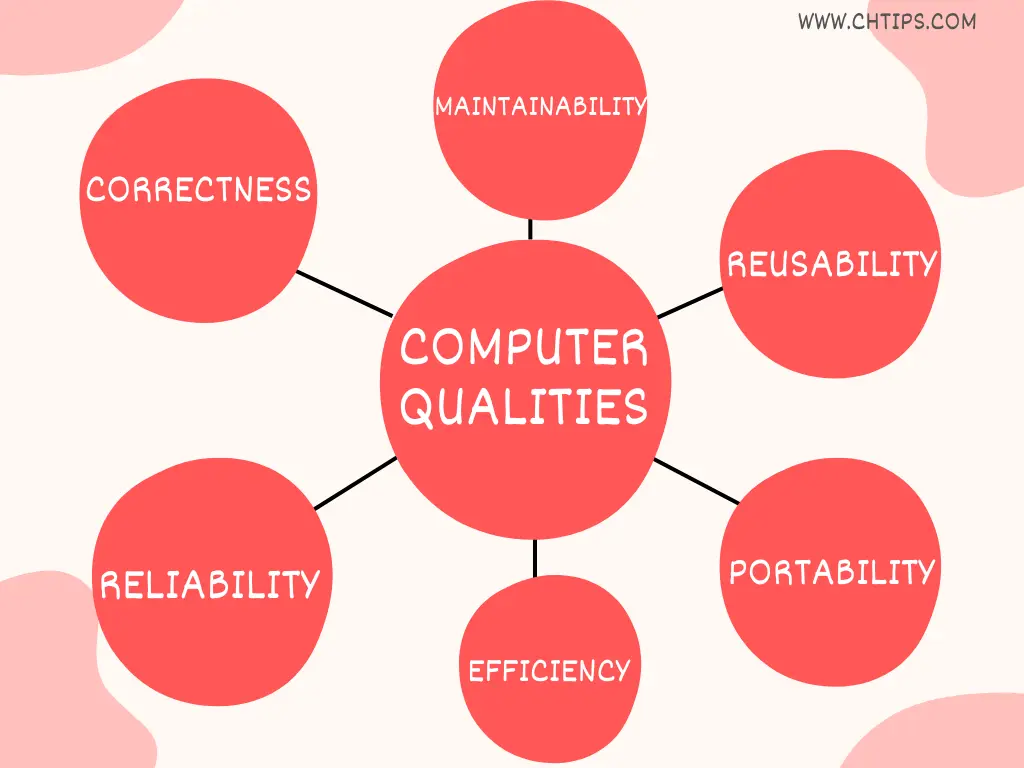
What are the 10 Features of Computer?
The 10 features of computer system are mentioned below.
- Speed.
- Accuracy.
- Versatility.
- Diligence.
- Storage.
- Reliability.
- Automation.
- Consistency.
- Memory.
- Power of Remembrance.
What are the Different Parts of Computer?
11 different parts of computer system are mentioned below.
- Central Processing Unit | Processor | CPU.
- Motherboard.
- RAM [Random Access Memory].
- Hard Disk Drives | SSD [Solid State Drives].
- Switching Mode Power Supply [SMPS].
- DVD RW.
- Cabinet | Case.
- Processor Fan.
- Monitor.
- Keyboard
- Mouse.
5 Generations of Computer Systems
| # | Computer Generation | Used | Language | Examples |
| 1 | First Generation | Vacuum Tubes | Machine Language | ENIAC:: Electronic Numerical Integrator and Computer. EDVAC:: Electronic Discrete Variable Automatic Computer UNIVAC 1:: Universal Automatic Computer 1 |
| 2 | Second Generation | Transistor | FORTRAN AND COBOL | IBM 7030/7094 Honeywell 400 Philco |
| 3 | Third Generation | Semiconductor | FORTRAN, COBOL, PASCAL, BASIC, C, C++, DBASE | PDP8, IBM360, PDP11. |
| 4 | Fourth Generation | Microprocessor | C and C++, Java, Net, | Intel Pentium AMD Apple II |
| 5 | Fifth Generation | Artificial Intelligence | Prolog | PARAM 10000 INTEL IPSC-1 |
Generations of Computer Systems
| Computer Generation | Year | Inventor | Used |
| First Generation Computer | 1946-1959 | J.P.Eckert and J.W. Mauchly | Vacuum Tubes and Magnetic Drum. |
| Second Generation Computer | 1908-1991 | Walter H. Brattain, John Bardeen, and William B | Transistor |
| Third Generation Computer | 1958 | Jack Kilby | Integrated Circuit (I.C.) |
| Fourth Generation Computer | 1971 | Federico Faggin | Microprocessor [CPU] |
| Fifth Generation Computer | 1955 | John McCarthy | Artificial Intelligence. |
10 Uses of Computer Systems
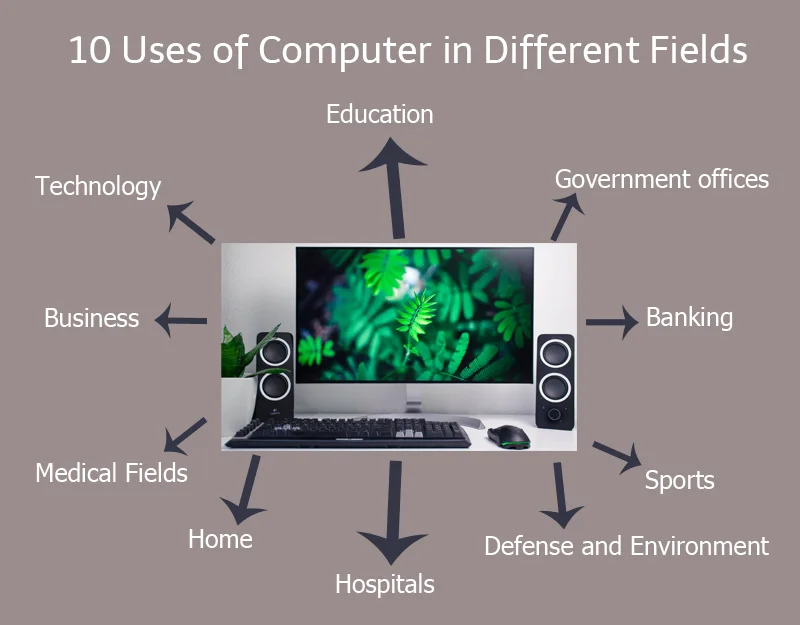
- Home.
- Medical Field.
- Online Trading.
- Online Education.
- Research.
- Entertainment.
- Industry.
- Education.
- Government.
- Banking.
- Business.
Different Types of Computer
The overall development of computers has reached new heights due to vast improvements in modern technology.
The fundamentals of computers have changed rapidly.
They are categorized into four different types according to their speed, size, capabilities, and cost.
- Super Computer
- Mainframe
- Mini
- Micro
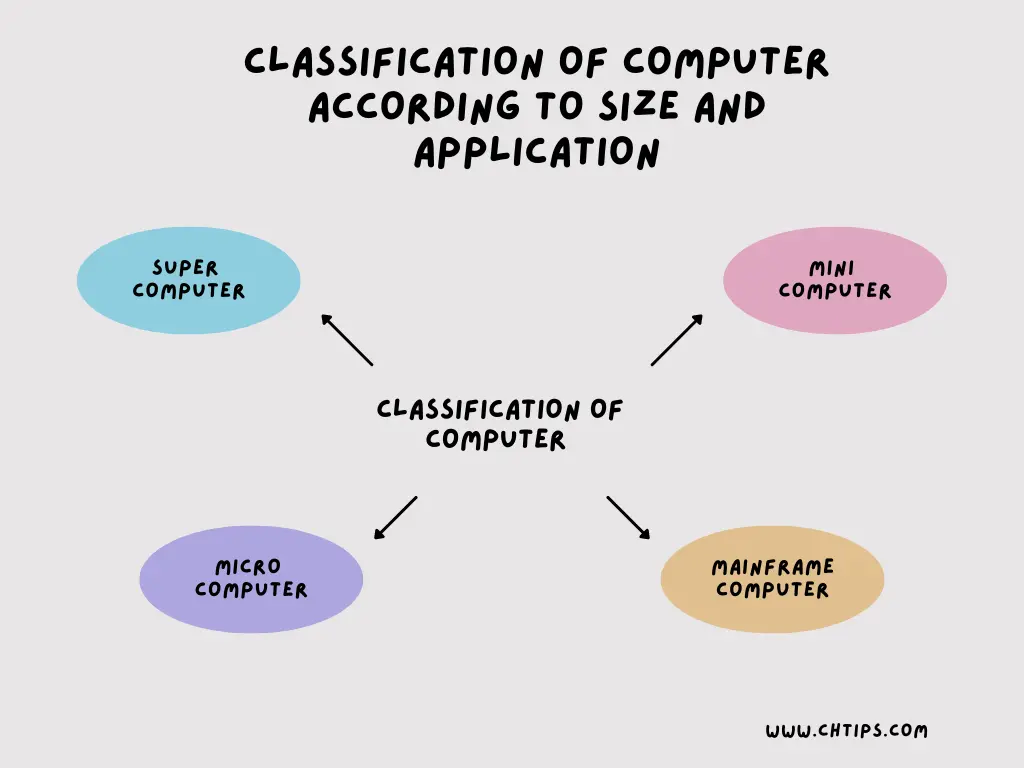
#1. Super Computer.
They are the fastest and most expensive computers compared to others. They require huge space for their installation.
#2. Mainframe Computer.
They are not as fast as supercomputers and require huge space for installation also they are very expensive.
#3. Mini.
They are smaller, cheaper, and slower compared to super and mainframe computers.
#4. Micro.
They are called Personal computers [PC].
Advantages of Computers
Computers are playing a vital role in the development of human society; they are making workload as easy, efficient, and fast as you would not have imagined before.
If you ask me what is the basic fundamental advantage of the computer. I will say its role in studying.
The Students can learn literally anything on the computer with internet connectivity, from science to philosophy, and acquire the necessary skills from online platforms to build their professional careers.
The use of modern-day computers in studying has changed students’ styles and learning methods; people don’t want to waste their time searching for good coaching classes in their town; they prefer online study where they can get a quality education with online certificates and even degrees.
Students can learn online at their own convenience.
The study material is in the form of digital mediums such as PDF, DOC, images, info-graphics, and video format for better understanding.
Below I have mentioned some of the basic advantages of Computer
- Online Education
- Business
- Speed
- Accuracy
- Online Education
- Military
- Research
Disadvantages of Computer System
As there is numerous advantage of using a modern-day personal computer there are disadvantages too.
- Spread of Pornography
- Hate & Violence Related Articles
- Cyber Crimes
- Negative Effect on Health
Computer Software and Hardware
Computer software can be described as a collection of small programs that are programmed in such a way they are capable of performing specific and special tasks whenever desired.
These types of software are developed by computer programmers or software developers who take care of users’ needs and intent.
There are mainly two types of software
- System Software
- Application Software
#1. System Software.
This is the software that directly interacts with the computer system. The primary examples are Operating systems [OS] and device drivers.
#2. Application Software.
These are also called customized software developed for personal use or for customers to perform specific tasks.
Example:: Tally, MS-office, ERP Software's
Frequently Asked Questions [FAQs] on Computer Fundamentals
Who is the Father of computers?
What is the Meaning of Fundamentals of Computer?
They are capable of deriving expected results with amazing speed and incredible accuracy.
Computers can also permanently store and access huge amounts of data and information.
Fundamentals of the computer syllabus include the study of input, output, motherboard, memory, and networking.
What are the Uses of Computers?
· Online Education | Online Tutoring.
· Entertainment.
· Research.
· Banking.
· Business.
. Online Trading.
Who Built the First Computer?
What are the 5 Basics of a Computer?
1. Input.
2. Output.
3. Control Unit.
4. Memory Unit.
5. Arithmetic and Logical Unit.
What are the 5 Parts of the CPU?
2. Control Unit.
3. Register.
4. Buses.
5. Cache.
4 Components of Computer Fundamentals?
• Output Unit.
• Memory Unit.
• Control Unit.
• Arithmetical and Logical Unit.
Get In Touch
I have also written and compiled some articles on computers and telecommunications, and please go through them.
I hope you will like reading it.
All the questions and queries related to the What is Computer Fundamentals with the basics are answered here.
If you have any questions about Computer Basic.
Don’t hesitate to contact me, and if you feel to add, remove or update anything from the article, please let me know in the comment section or via email.
I will be more than happy to update the article. I am always ready to correct myself.
Please share this article with your friends and colleagues; this motivates me to write more related topics.
!!! Thank You For Reading !!!
